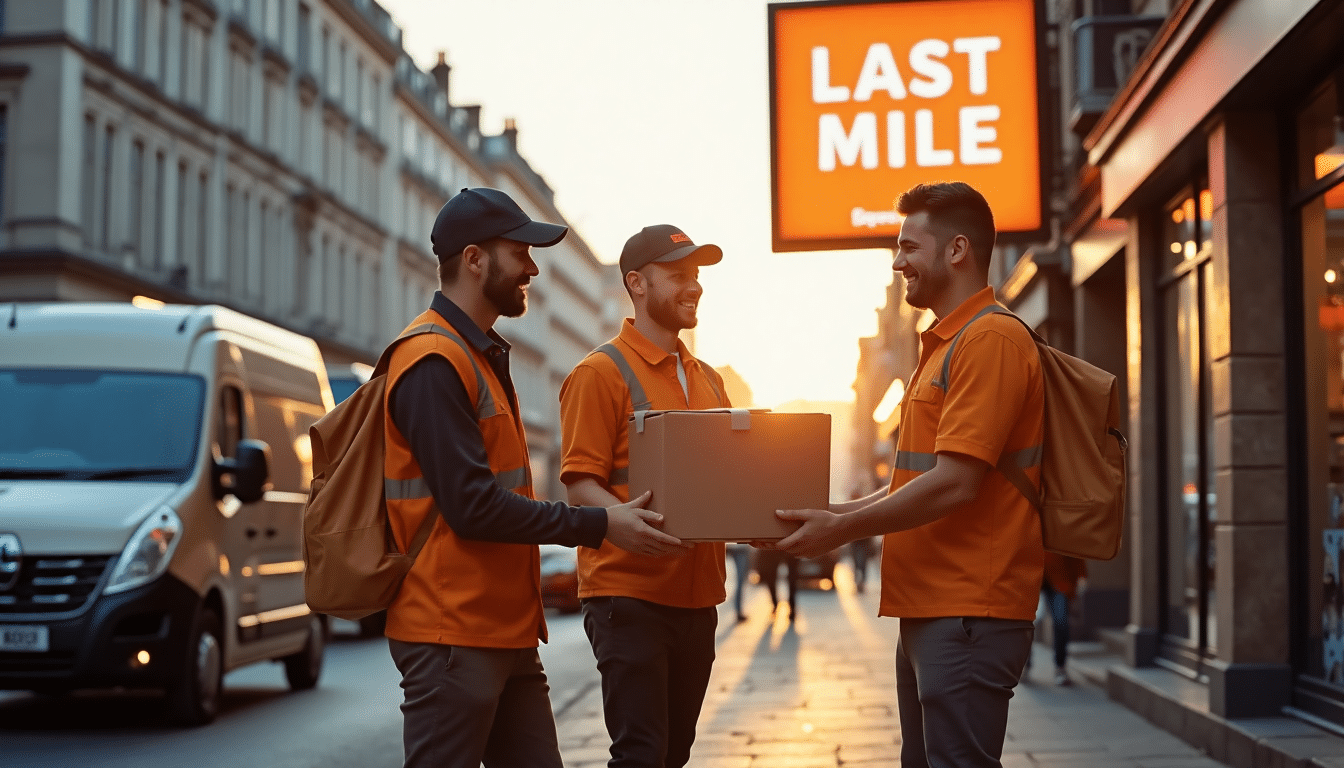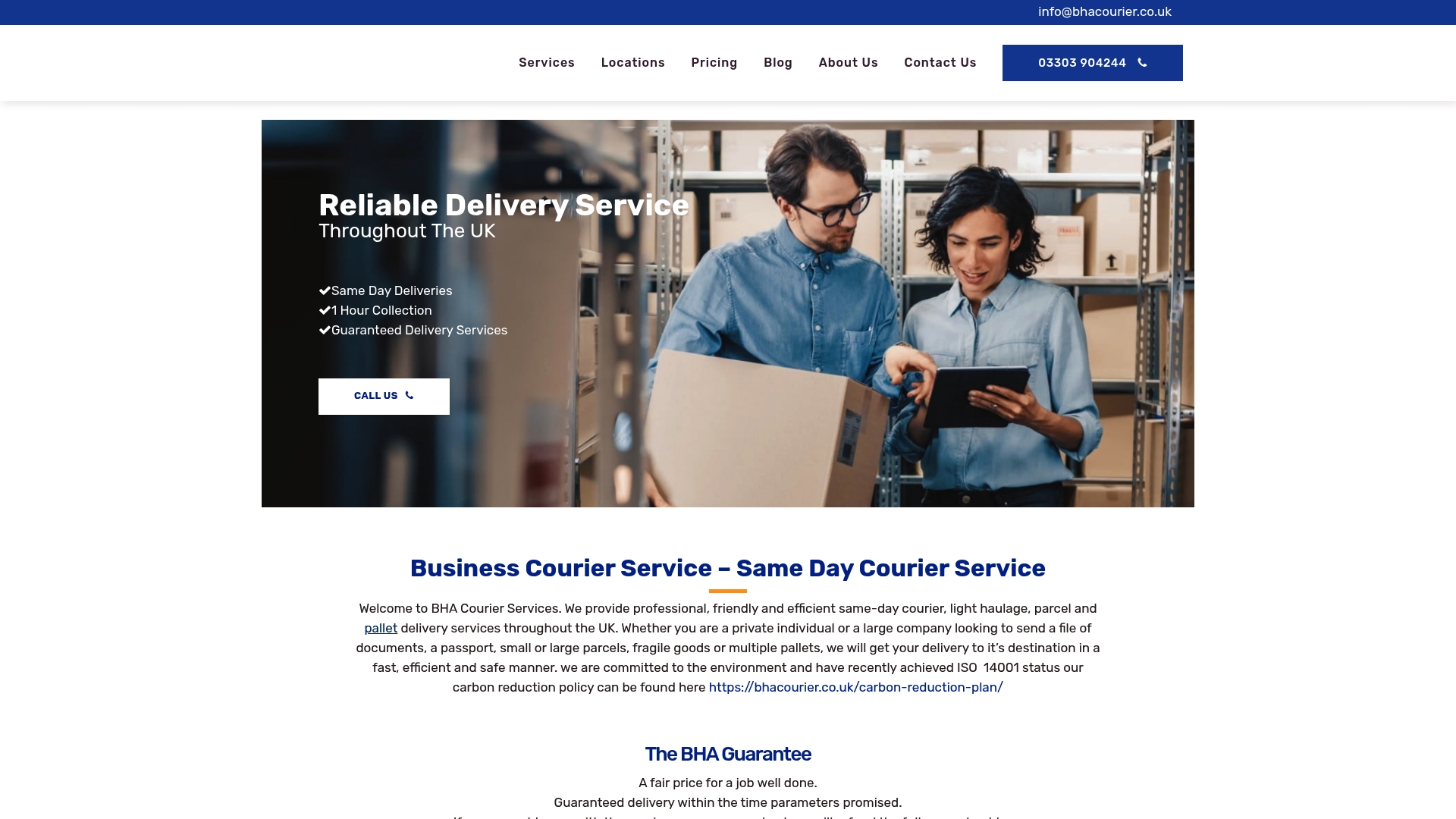
09 Jul Last Mile Delivery Challenges 2025: Key Solutions for UK Businesses

Last mile delivery in the UK is facing rapid shifts, with urban van movements rising by a staggering 106 percent over the past decade. Most would assume this explosion in demand is all about faster parcels and bustling high streets. Yet, the real challenge is not speed at all. Instead, the true hurdle for businesses is tackling soaring costs and complex regulations—factors that now threaten to slow deliveries and squeeze profits unless bold new solutions take hold.
Table of Contents
- Understanding Last Mile Delivery Challenges In The UK
- Common Barriers For SMES And Online Sellers
- Solutions For Time-Sensitive And Local Deliveries
- Future Trends Impacting Last Mile Delivery In 2025
Quick Summary
| Takeaway | Explanation |
|---|---|
| Urban Logistics Complexity | Urban deliveries are increasingly complex due to rising van movements, congestion, and stringent regulations, compelling businesses to rethink traditional models for efficiency. |
| Financial Constraints for SMEs | Cost management remains a significant barrier for SMEs, with delivery infrastructure costs consuming up to 53% of shipping expenses, affecting pricing and service quality. |
| Technological Adoption is Essential | Embracing advanced technologies such as AI, predictive analytics, and real-time tracking is crucial for optimising delivery processes and gaining competitive advantages. |
| Sustainability is Non-Negotiable | Companies must invest in sustainable logistics solutions like electric vehicles and carbon-neutral strategies to meet new environmental standards and consumer expectations. |
| Future Trends Will Redefine Delivery | Emerging trends such as autonomous delivery systems, hyper-personalisation, and green logistics strategies will transform last-mile delivery, creating significant opportunities for businesses. |
Understanding Last Mile Delivery Challenges in the UK
The UK delivery landscape is experiencing unprecedented transformation, with last mile delivery emerging as a critical battleground for businesses seeking efficiency and customer satisfaction. As online shopping continues to surge, companies face complex challenges that demand innovative solutions and strategic approaches.
The Growing Complexity of Urban Deliveries
Urban delivery environments have become increasingly challenging. Research from local government studies reveals a staggering 106% increase in van movements over the past decade, dramatically intensifying urban congestion and logistical complexity. This exponential growth creates significant pressure on existing transportation infrastructure and requires businesses to rethink traditional delivery models.

The core challenges emerge from multiple interconnected factors. Traffic congestion, limited parking, strict environmental regulations, and rising consumer expectations for rapid delivery create a complex ecosystem that demands sophisticated navigation. Small and medium enterprises particularly struggle to balance cost-effectiveness with customer satisfaction in this intricate delivery landscape.
Economic and Environmental Pressures
Business leaders must simultaneously address economic constraints and environmental responsibilities. Local authority research highlights that many organisations lack the expertise and resources to effectively manage sustainable last mile delivery solutions. The financial viability of innovative approaches like freight consolidation centres remains challenging, requiring critical mass demand to ensure economic sustainability.
Companies are now compelled to invest in technologies and strategies that reduce carbon footprints while maintaining competitive delivery times. Electric vehicles, route optimization software, and decentralized distribution networks are becoming essential tools in addressing these multifaceted challenges. Learn more about our regional delivery strategies for tailored solutions across different UK territories.
Technology and Innovation as Key Enablers
Digital technologies are transforming last mile delivery from a logistical challenge into a strategic opportunity. Advanced routing algorithms, real-time tracking systems, and predictive analytics enable businesses to optimize delivery processes, reduce operational costs, and enhance customer experiences. Machine learning models can now predict delivery windows with unprecedented accuracy, allowing companies to provide more precise and reliable service.
The convergence of data analytics, artificial intelligence, and logistics expertise presents UK businesses with powerful tools to reimagine their delivery strategies. By embracing technological innovation, companies can convert last mile delivery challenges into competitive advantages, creating more efficient, sustainable, and customer-centric logistics ecosystems.
Navigating these challenges requires a holistic approach that balances technological innovation, economic considerations, and environmental responsibility. Successful businesses will be those that view last mile delivery not as a cost centre, but as a strategic opportunity for differentiation and growth.
Common Barriers for SMEs and Online Sellers
Small and medium-sized enterprises (SMEs) and online sellers in the UK face increasingly complex challenges in managing last mile delivery operations. These challenges range from financial constraints to technological limitations, creating significant hurdles in maintaining competitive and efficient delivery services.
Cost Management and Financial Constraints
Research from industry experts reveals that cost management remains the most critical barrier for SMEs in last mile delivery. The expenses associated with establishing robust delivery infrastructure are substantial, often representing up to 53% of total shipping costs. Small businesses struggle to absorb these expenses while maintaining competitive pricing, forcing many to compromise on delivery speed or quality.
The financial burden extends beyond direct transportation costs. Insurance, vehicle maintenance, technology investments, and potential return management further strain limited budgets. Many online sellers find themselves caught in a challenging cycle where improved delivery capabilities require significant upfront investment, yet current revenue streams cannot support such expenditures.
Technological and Operational Limitations
Technological sophistication presents another significant barrier for SMEs. UK government research recommends exploring digital twin technologies to enhance logistics solutions, but implementing such advanced systems requires substantial technical expertise and financial resources.
Route optimization, real-time tracking, and predictive delivery analytics remain challenging for smaller businesses. Without access to sophisticated software and data analysis tools, online sellers often rely on manual processes that are time-consuming and prone to errors. This technological gap prevents them from achieving the efficiency levels of larger competitors who can invest in comprehensive logistics management systems.
Regulatory and Environmental Compliance
Local Government Association reports emphasize the growing complexity of regulatory environments surrounding last mile delivery. Urban areas increasingly implement strict environmental regulations, low-emission zones, and delivery time restrictions that disproportionately impact smaller businesses with limited operational flexibility.
Environmental compliance adds another layer of complexity. Reducing carbon footprints, managing vehicle emissions, and meeting sustainability targets require significant strategic planning and investment. Explore our regional delivery approaches that can help businesses navigate these challenging regulatory landscapes.
The cumulative effect of these barriers creates a challenging ecosystem for SMEs and online sellers. Those unable to adapt risk becoming uncompetitive in an increasingly sophisticated delivery market. Success now demands a multifaceted approach that balances technological innovation, financial prudence, and strategic adaptability.
Addressing these challenges requires collaborative solutions involving technology providers, logistics partners, and supportive policy frameworks. SMEs that can effectively navigate these barriers will transform potential limitations into competitive advantages, creating more resilient and responsive delivery capabilities.

Solutions for Time-Sensitive and Local Deliveries
Time-sensitive and local deliveries represent a critical frontier in the UK’s logistics landscape, demanding innovative approaches that balance speed, efficiency, and environmental responsibility. As consumer expectations continue to evolve, businesses must develop sophisticated strategies to meet increasingly complex delivery challenges.
Urban Logistics Transformation
Research from logistics experts highlights the potential of micro-fulfillment centers as a game-changing solution for urban delivery networks. These strategically positioned distribution hubs allow businesses to dramatically reduce delivery times and optimize local logistics infrastructure. By establishing smaller, more agile distribution points within densely populated areas, companies can significantly cut down on transportation distances and improve overall delivery efficiency.
Electric cargo bikes emerge as a particularly innovative solution for urban environments. Fleet management research demonstrates their ability to navigate congested city streets, bypass traffic constraints, and reduce carbon emissions. These nimble vehicles can often complete deliveries faster than traditional vans, particularly in areas with significant traffic challenges.
Strategic Delivery Zone Management
Logistics industry analysis emphasizes the importance of creating dedicated delivery zones in urban areas. These designated spaces provide structured solutions for the complex challenges of local deliveries, reducing time spent searching for parking and streamlining the entire delivery process.
Implementing intelligent delivery zone strategies involves multiple approaches. This includes creating time-specific loading areas, developing smart parking solutions for delivery vehicles, and implementing digital booking systems that allow precise scheduling of delivery windows. Such approaches not only improve efficiency but also reduce urban congestion and improve overall traffic management.
Technology-Driven Delivery Solutions
Advanced technologies are revolutionizing time-sensitive delivery capabilities. Real-time tracking systems, predictive routing algorithms, and AI-powered logistics management enable businesses to offer unprecedented levels of delivery precision. Learn more about our specialized courier services that leverage cutting-edge technological approaches to meet diverse delivery requirements.
Machine learning algorithms can now predict optimal delivery routes, taking into account real-time traffic conditions, historical performance data, and specific time-sensitive requirements. This technological approach allows businesses to offer more accurate delivery windows, reduce operational costs, and significantly improve customer satisfaction.
The future of local and time-sensitive deliveries lies in an integrated approach that combines technological innovation, strategic infrastructure development, and adaptive logistics management. Businesses that can successfully blend these elements will be best positioned to meet the evolving demands of modern delivery ecosystems.
Navigating the complexities of local deliveries requires a holistic perspective that goes beyond traditional transportation models. By embracing innovative solutions and remaining adaptable, companies can transform time-sensitive delivery challenges into competitive advantages.
Future Trends Impacting Last Mile Delivery in 2025
The landscape of last mile delivery is undergoing a transformative evolution, with emerging technologies and shifting consumer expectations reshaping the entire logistics ecosystem. As we approach 2025, businesses must anticipate and adapt to groundbreaking trends that will fundamentally redefine delivery strategies across the United Kingdom.
Autonomous and Intelligent Delivery Systems
Market research from Grand View Research reveals that the UK autonomous last-mile delivery market is projected to reach an impressive £436.2 million by 2030, with a substantial compound annual growth rate of 24.1% from 2025 to 2030. This exponential growth signals a radical transformation in delivery methodologies.
Autonomous delivery vehicles and drone technologies are moving from experimental concepts to practical implementation. These intelligent systems promise unprecedented efficiency, reducing human error, minimizing operational costs, and enabling 24/7 delivery capabilities. Advanced machine learning algorithms will enable these systems to optimize routes, predict delivery challenges, and adapt in real-time to complex urban environments.
Sustainable and Green Logistics Strategies
Sustainability research from BDO UK emphasizes the critical importance of environmental initiatives in the logistics sector. Electric vehicles, alternative fuel technologies, and carbon-neutral delivery strategies are no longer optional but essential components of modern logistics operations.
Businesses are increasingly investing in green technologies that reduce carbon footprints while maintaining operational efficiency. This includes electric and hydrogen-powered delivery vehicles, optimized routing to minimize fuel consumption, and innovative packaging solutions that reduce environmental impact. The convergence of sustainability and technology will create more environmentally responsible delivery ecosystems.
Hyper-Personalized Delivery Experiences
Consumer expectations are driving a revolution in delivery personalization. Advanced data analytics and artificial intelligence will enable businesses to offer unprecedented levels of delivery customization. This includes precise delivery time windows, real-time tracking with minute-by-minute updates, and adaptive delivery options that respond to individual consumer preferences.
Explore our tailored courier services that are already adapting to these emerging technological trends. The future of last mile delivery is not just about moving packages but creating seamless, personalized experiences that align with individual consumer lifestyles and expectations.
The integration of Internet of Things (IoT) devices, predictive analytics, and machine learning will allow businesses to anticipate delivery preferences, optimize logistics networks, and provide transparent, reliable service. Customers will increasingly expect delivery experiences that are not just efficient but intelligently adaptive to their unique requirements.
As we move towards 2025, successful businesses will be those that view last mile delivery not as a logistical challenge but as a strategic opportunity for innovation, customer engagement, and competitive differentiation. The convergence of technology, sustainability, and customer-centric approaches will define the next generation of delivery solutions in the United Kingdom.
To help clarify the specific obstacles faced by SMEs and online sellers in last mile delivery, the following table summarises the main barriers highlighted in this section.
| Barrier Category | Specific Challenges |
|---|---|
| Cost Management | Infrastructure expenses, up to 53% of shipping costs, insurance, vehicle maintenance, tech investment, returns management |
| Technological Limitations | Lack of access to route optimisation, real-time tracking, predictive analytics, reliance on manual/logistical processes |
| Regulatory & Environmental Compliance | Navigating low-emission zones, delivery time restrictions, carbon footprint reduction, increased planning and investment needs |
Looking ahead, the article details several key trends that will shape last mile delivery in the UK. The table below compares these trends, their main features, and the potential opportunities they bring for businesses.
| Trend | Key Features | Opportunities for Businesses |
|---|---|---|
| Autonomous & Intelligent Delivery | Drones, autonomous vehicles, machine learning optimisation, 24/7 ops | Cost reduction, improved efficiency, fewer errors |
| Sustainable & Green Logistics | Electric/hydrogen vehicles, eco packaging, routing, carbon neutrality | Meet regulations, attract eco-conscious consumers, lower emissions |
| Hyper-Personalised Experiences | Real-time tracking, adaptive options, analytics & AI personalisation | Higher customer loyalty, better user experience, differentiation |
Frequently Asked Questions
What are the main challenges faced by UK businesses in last mile delivery?
The primary challenges include rising costs, complex urban delivery regulations, and increasing consumer expectations. These factors create operational difficulties for businesses, particularly for SMEs.
How can SMEs manage the costs associated with last mile delivery?
SMEs can effectively manage costs by leveraging technology for route optimisation, exploring partnerships to share delivery resources, and investing in micro-fulfilment centres to enhance local logistics efficiency.
What technological solutions can improve last mile delivery?
Adopting technologies such as real-time tracking systems, predictive analytics, and AI-driven routing algorithms can significantly enhance delivery efficiency, reduce costs, and improve customer satisfaction.
How is sustainability impacting last mile delivery in the UK?
Sustainability is crucial, with businesses required to adopt eco-friendly practices like using electric vehicles and optimising delivery routes to reduce carbon emissions, thereby aligning with new regulations and consumer expectations.
Conquer Last Mile Delivery Challenges with Reliable, Real-Time Solutions
Struggling to balance rising delivery costs and strict urban regulations while meeting customer expectations for fast, secure shipments? As highlighted in our article, last mile delivery is now a test of financial resilience and operational agility. If challenges like cost control, environmental responsibility, and the need for advanced tracking keep you up at night, your business needs a partner who can help you take control.

BHA Courier brings you the rapid, secure, and eco-friendly delivery solutions you need to stay competitive. Our same-day and next-day courier services use real-time tracking and a nationwide network to eliminate delays and manage costs with precision. We are ISO 14001 certified, so your deliveries are not only efficient but align with the latest green standards. Ready to unlock a smarter, more resilient last mile strategy? Explore our full range at BHA Courier and discover how you can future-proof your UK deliveries today.


